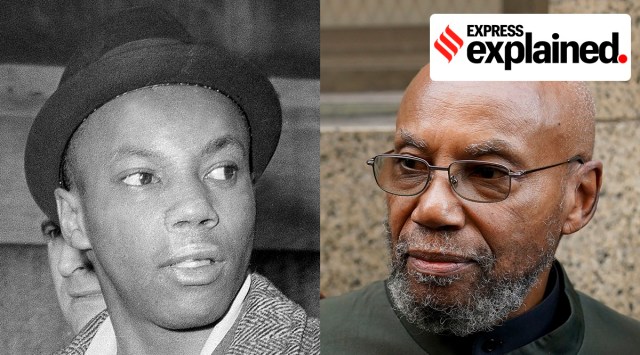Why New York will pay $36 million to men exonerated in Malcolm X killing
Two wrongfully convicted men served about two decades in prison in a landmark case that raised questions about racism in the US criminal justice system.
 Muhammad Aziz, a suspect in the slaying of Malcolm X, after his arrest, in New York, on Feb. 26, 1965, left, and Aziz outside court after his conviction in the killing of Malcolm X was vacated on Nov. 18, 2021, in New York. (AP Photo/File)
Muhammad Aziz, a suspect in the slaying of Malcolm X, after his arrest, in New York, on Feb. 26, 1965, left, and Aziz outside court after his conviction in the killing of Malcolm X was vacated on Nov. 18, 2021, in New York. (AP Photo/File)A man who was exonerated last year in the assassination of legendary Black civil rights activist Malcolm X and the estate of a second man who was cleared of the charge posthumously reached a settlement of $36 million with New York City and state, their attorney David Shanies said on Sunday (October 30).
Reuters reported that Muhammad Aziz, 84, had sought $40 million after serving about two decades in prison and more than 55 years after being wrongly blamed in a case that raised questions about racism in the US criminal justice system.
Khalil Islam, who died in 2009 at age 74, also spent more than 20 years in prison and was exonerated along with Aziz in November 2021. His estate had also filed a lawsuit. The city has agreed to pay $26 million and the state will pay $10 million, Shanies told Reuters. The survivor and the man’s estate will split the settlement. A third man, Mujahid Halim, was also convicted. He testified that Aziz and Islam were innocent.
“Muhammad Aziz, Khalil Islam, and their families deserve this for their suffering,” Shanies said. “They suffered a lifetime under the cloud of wrongly being accused of killing a civil rights leader.” Nick Paolucci, a spokesman for the New York City Law Department, told the New York Times that, “this settlement brings some measure of justice to individuals who spent decades in prison and bore the stigma of being falsely accused of murdering an iconic figure.”
Who was Malcolm X, and what were the circumstances before his death?
The 1960s was a period of renewed assertion of civil rights in the US, with several movements and political figures emerging at the time. Among the black community, Malcolm X was known to be an influential figure who was radical in his method for achieving civil rights. “I am for violence if non-violence means we continue postponing a solution to the American black man’s problem,” he said. His approach was often contrasted with Martin Luther King Jr., another important leader in the same movement who advocated for non-violence and integration instead.
Malcolm X joined the Nation of Islam (NOI), an African American movement that combined Islam and black nationalism, in the 1950s. But in the 1960s, Malcolm’s views slowly started to change. This is largely attributed to his travel through Africa, where he interacted with Muslims of all races. He began to question the anti-white ideology of the NOI, and ultimately in 1964, he left the organisation over disagreements about King’s personal life and the NOI’s attitude towards police violence against Muslims. This was also when he converted to Sunni Islam.
He said at the time that because of this split, many within the NOI were extremely angry at him and saw him as a traitor to the cause. As a result, he anticipated that there could be a threat to his life.
How was Malcolm X assassinated, and what did authorities claim?
On February 21, 1965, during a speech at the Audubon Ballroom in Manhattan, the 39-year-old Malcolm was attacked by gunmen who shot him. One of Malcolm’s bodyguards was able to shoot one of the men, Halim, while Aziz was arrested five days later, and Islam another five days after that. Within a week, the three members of the NOI were charged with murder.
When Halim took the stand during his trial, he confessed to the crime but said the other two men were innocent. Despite this, they were all found guilty and sentenced to life in prison. However, doubts had always been raised about their involvement due to the lack of eyewitness testimony.
A succession of amateur investigators — journalists, historians, biographers and others — took up the case through the years including Abdur-Rahman Muhammad, who hosted a Netflix documentary series in 2020 called Who Killed Malcolm X that again assembled the case for the two men’s innocence — and others’ guilt.
Last year, the two men were exonerated following a 22-month investigation conducted jointly by the Manhattan district attorney’s office and attorneys for the two men. It found that prosecutors, the FBI and the New York City Police Department had withheld key evidence that, had it been turned over, would likely have led to the men’s acquittal, reported The New York Times.
Photos





- 01
- 02
- 03
- 04
- 05
































